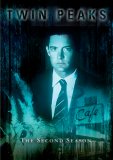| Reviews & Columns |
|
Reviews DVD TV on DVD Blu-ray 4K UHD International DVDs In Theaters Reviews by Studio Video Games Features Collector Series DVDs Easter Egg Database Interviews DVD Talk Radio Feature Articles Columns Anime Talk DVD Savant Horror DVDs The M.O.D. Squad Art House HD Talk Silent DVD
|
DVD Talk Forum |
|
|
| Resources |
|
DVD Price Search Customer Service #'s RCE Info Links |
|
Columns
|
|
|
Twin Peaks - The Second Season
THE SHOW:
"Hell of a way to kill a tick..."
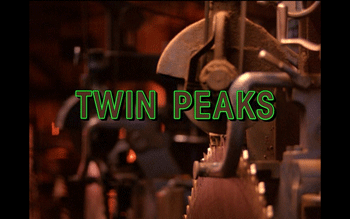
Yes, the wait is over. Twin Peaks – The Second Season is finally here.
I have to admit, I was a little nervous about watching the show again. It's been years since I've seen the finale, and though the details about the last shows were fuzzy for me, the sense of disappointment was still palpable. In many ways, Twin Peaks may have been better off consigned to the "Brilliant But Cancelled" bin earlier in its run. The first season was like a hard diamond, a perfect example of what a television show should be. Even removing the hype and resulting scrutiny the series was under back when it first aired in 1990, just in sheer terms of quality the second season had a lot to live up to.
Plot-wise, the first season cliffhanger was a doozy. Juvenile delinquent Bobby (Dana Ashbrook) had framed brooding do-gooder James (James Marshall) and gotten him arrested for drugs, Audrey Horne (Sherilyn Fenn) was in over her head at the One-Eyed Jacks whorehouse, and Leo (Eric Da Re) had tied up Shelly (Mädchen Amick) over at the mill and left her there to burn with the building, all before getting himself shot. Shelly was saved, but Catherine (Piper Laurie) is presumed dead and Josie (Joan Chen), who owns the mill, has skipped town. Agent Dale Cooper (Kyle MacLachlan) had also been shot by an unknown assailant, and the lead witness in the murder of Laura Palmer (Sheryl Lee) was killed in his hospital bed by the victim's father (Ray Wise). That Nadine (Wendy Robie) took a handful of sleeping pills in grief over her failed inventions and her strained marriage to Big Ed Hurley (Everett McGill) means that just about everybody is now gathered at the hospital waiting for answers. Naturally, so were we glued to our television sets, and there was considerable attention being paid to how it would all tie up.
Season 2 begins with a two-hour opening episode (well, more like 90 minutes once the commercials were removed) that takes us right back into the thick of things. It begins with Cooper bleeding on his hotel floor, ignored by a geriatric room service attendant and then visited by a bald giant doling out cryptic clues. We're off to the whacky races.
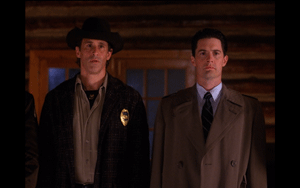
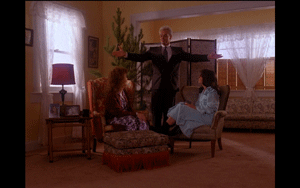
Almost immediately, however, one can sense creators David Lynch and Mark Frost starting to buckle under the weight of their own success. For their big return, they seem to be ratcheting up the weird to give the people what they want--more shots of donuts, more coffee, and even worse, they started to indulge more in goofball humor that didn't really play out all that well, like a running gag about hospital food that feels out of place. The appeal of Twin Peaks was less about its strangeness--watch the first season again, it's not nearly as out there as you probably remember--but the splicing together of two big melodramatic genres, the primetime soap opera and the B-movie potboiler. The show was like a blended shake of all the things David Lynch remembered from TV and movies he saw as a kid; so, secret societies that solved crimes, bebop jazz, and tight sweaters and saddle shoes. At its best, Twin Peaks exuded cool while showing off a cheeseball emotional side.
Perhaps the biggest mistake Frost and Lynch made was drawing out the Laura Palmer murder investigation. Season 2 immediately reverses all the things we learned in season 1. Leo and his cronies are no longer as guilty as they might have seemed, and in a lot of ways, the show knocks everything about the investigation back to square one, back to the greasy-maned Bob (Frank Silva) and the one-armed man (Al Strobel). As future quirky mystery shows like The X-Files and Lost would later prove, the longer you withhold the solutions from the audience, the harder it's going to be to deliver a satisfying resolution. Too many twists just leaves you with a storyline full of knots you can't unravel. In the first few episodes of Twin Peaks – The Second Season there are several instances where, from one episode to the next, the writers seem to conveniently shove aside things they already know to milk a little more drama out of re-asking the question.
Really, after we spent the first season with the characters, we had gotten to know them and like them. This makes the filler subplots the writers created to prolong the capture of Laura's killer more interesting than what was intended to be the main storyline. In the first few episodes, the emerging state of Benjamin Horne (Richard Beymer) as the town's lead villain and the mission to rescue Audrey outshine Donna (Lara Flynn Boyle) and Maddy (Sheryl Lee again) playing amateur detectives investigating the shut-ins on Laura's Meals On Wheels route. Likewise, Bobby and Shelly trying to establish a life together while dealing with a catatonic Leo and the love triangle of Deputy Andy (Harry Goaz), Lucy (Kimmy Robertson), and the department story Don Juan, Dick (Ian Buchanan), have more juice than seeing the excellent Miguel Ferrer reexamine the same old evidence from the murder scene to come up with startling new information that someone should have noticed before. (A handful of episodes in, and we learn that only 12 days have passed since Cooper first got to town, which makes the timeline seem a little screwy.) Those side stories take a lot of the spotlight in the first half of the second season and suggest that Twin Peaks might have had a longer life as a regular cliffhanger serial had they abandoned the need for the series through-line.
Things start to get back on track at the end of episode 14 (the seventh of the season), with a violent, disturbing revelation about Bob that assures the viewer that there is a grander scheme to the Laura Palmer story that has a better payoff than just a random night partying with drug dealers gone wrong. As this situation unfolds, Agent Cooper, Sheriff Truman (Michael Ontkean), the Log Lady (Catherine E. Coulson), and various other members of the cast watch Julee Cruise perform at the Bang Bang Bar. Cooper sees another vision of the giant, and when the messenger fades away, a sense of grief settles in the room. Everyone there feels it all at once, a reminder to us and them that everything is connected to something larger. It's a promise of sorts that we've still got a reason to be with the show, and it sets us up for the middle portion of the this cycle. This good will is carried through episodes 15 and 16, as the killer is finally unmasked, and as the Log Lady tells us in her intro, shifts the queries from who to why.
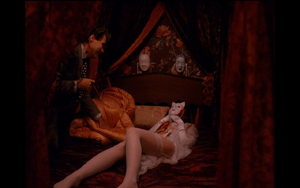
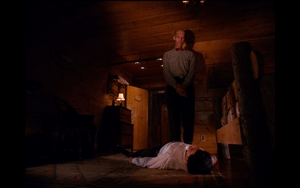
At this point in the Twin Peaks saga, everything that has happened, no matter how far out they may be on the surface, still has a rational explanation. This is how I preferred the show. It's far more intriguing when the bizarre is an unknown quantity, and which side of the skeptical line you fall on depends on how much you choose to believe. (The best episodes of The X-Files were also like this, Agent Scully's disbelief providing a plausible alternative to Agent Mulder's more fantastic explanations.) There is also some indication of how the show could have settled into more familiar territory for episodic television. The characters are now free to live their lives, just as I had hoped they would at the beginning of the season. Even Agent Cooper gets to pause and deal with the aftermath of the Laura Palmer case, as his raid on One-Eyed Jacks led to him getting suspended from the Bureau. New guest stars, such as David Duchovny and the legendary Jane Greer (Out of the Past's femme fatale), move in and out of the show, and new plot lines develop around the mill and in the Horne residence. Most of it works, with only Nadine's return to high school falling in the fondue pot. The shows get pretty fun. The creators get to have their cake and eat it, too, indulging in soap opera clichés while simultaneously making fun of them.
Of the other guest stars this season, some have brief roles and some get to stick around for more sustained appearances, and a few of them were cast here before they were known quantities. They include Alicia Witt, Billy Zane, Molly Shannon, David Lynch, Heather Graham, David L. Lander (a.k.a. Squiggy), and Brenda Strong, now known as the narrator of Desperate Housewives (having replaced, interestingly enough, Sheryl Lee, who did the voiceover in the original pilot). There are also guest directors, including James Foley (Glengarry Glen Ross) and Diane Keaton. Surprisingly, Keaton's episode, #22, is one of the worst from a style standpoint, grasping too hard at capturing the Twin Peaks "feel."
The major through-line that emerges in this part of the series spins out of Agent Cooper's suspension from the Bureau, morphing into the deadly chess game with his deranged mentor, Windom Earle (Kenneth Welsh). This is also where Twin Peaks begins to slide further and further into implausibility, losing all grounding. It takes a turn for the worse in episode 23, when Josie Packard meets an overly strange fate that never gets returned to or explained, and both Bob and the Man from Another Place (Michael J. Anderson), the dancing dwarf, emerge from the shadows. Sticking these characters back into the story feels forced and a bit silly. Similarly, new elements like the investigation of UFOs and the divided houses of good and evil, the White Lodge and Black Lodge, cause the show to veer off into ridiculous territory.
Naturally, this culminates in the series finale, which is every bit as tedious as a I remember. From what I recall, we knew going in that this would be the final episode, but for as much as Lynch and Frost attempt to wrap up, they also leave quite a bit hanging, presumably for the movie franchise that never happened. This means we get cliffhangers that will never be explained featuring Audrey, the Hurleys, and Leo Johnson. These things are forgivable, however, and easily forgotten when faced with the show's back half. Directed by Lynch himself, this last episode is a total mess. Agent Cooper follows Windom Earle into the Black Lodge, the velvet-curtained dreamscape where Cooper previously picked up the clues to solving Laura Palmer's murder. Lynch spends an inordinate amount of time here, piling on backwards dialogue and double imagery, presumably to hammer home the idea that man has a dual nature and the capacity for both good and evil. It's a lot of hogwash, however, a string of empty images where the director tries to shoehorn in too many details from the previous 28 shows and somehow link everything together. If there is a secret code here, Lynch forgot that there would be no denouement. Though much of the initial murder mystery was solved in a similar fashion, we were also privy to an aftermath where Cooper explained to Sheriff Truman what it all meant. Even the dancing dwarf had a real life analogue. So, if he was meant to signify one thing before, what does he signify here at the end?
The final insult to the audience comes in the very last shots, however, after we've left the Black Lodge and in the closest thing to an epilogue we're going to get. It's the biggest cliffhanger of all, and it ends the series all wrong. It seems someone should have considered the fact that if they couldn't keep the TV show going, there was no guarantee there would be movies either. Or at least they could have made a motion picture sequel instead of a prequel. The way Twin Peaks wraps up, evil essentially wins, and the white glow of innocence that stayed bright through two years of television is proven to be a lie. Is that really what David Lynch and Mark Frost wanted to leave us with?
I suppose it was inevitable. As I had already noted in my summation of the season 2 premiere, Twin Peaks was always lacking the muscle to carry its own weight. Lucky for the show's creators, the last episode is just one small piece of the overall legacy, and what burns brightest in most people's minds is the series beginning. Twin Peaks really was one of the most individualistic series to ever appear on network television. It was a grand experiment that defied the odds by lasting even as long as it did, and that it still manages to hold our interest all the way to that final hour is the experiment's true success. Never before and never again would there be such a combination of the bizarre and the mundane, bending genres to make an honest-to-goodness phenomenon. Snuffed too early or maybe left alone to run too long, it's a debate I'm sure will inspire a myriad of arguments. Either way, it's a boon that DVD allows us to preserve such things so that we can always peer back at the incredible pop culture explosion that was Twin Peaks.
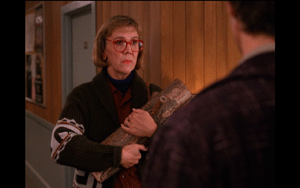
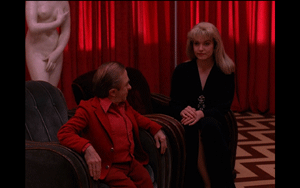
THE DVD
Video:
Made in the early '90s, Twin Peaks was shot in full frame. The change from Artisan to Paramount for The Second Season is immediately apparent in the image quality on these new DVDs. The first season set was overly saturated, with colors burning pretty hot. Most of the actors looked orange on the old discs, and right from the first scene on the season 2 premiere, you can finally see Kyle MacLachlan's real skin tone. (Perhaps a little too much. Check those eyelashes at the hospital when he's questioning Dr. Jacoby. Quel mascara!) The picture still isn't perfect, there is some combing and the occasional surface scratch, but comparatively, we've moved up a grade or two.
The design of the discs is also much better. Unlike last time, we get a "play all" option on The Second Season, complete with the choice of turning the Log Lady intros on or off. They've also snipped the "previously on" intros from each episode and organized the chapters on each show so you can skip over the opening credits if you so choose.
There are 22 episodes included on Twin Peaks – The Second Season. Handily, the studio keeps a sequential numbering from season one, starting this time around with "episode 8," maintaining a sense that the whole series is one complete package. While the design of the box maintains the look of the original set, Paramount has ditched the clear outer slipcase and opted to put the discs in slim plastic cases rather than the unwieldy multi-gatefold/plastic-tray combo of season one. There are two discs in each case, six discs in all, with each DVD housing four episodes (except DVDs 1 and 6, which have three due to the double-length premiere and simply running out of shows, respectively). Each episode is about 45 minutes in length.
Sound:
The audio is mixed in 5.1 and is pretty good all around. David Lynch always liked sound effects, and you can appreciate all the various noises employed throughout the show, as well as Angelo Badalemnti's famous musical score. Alternate audio options include a Spanish and Brazillian Portugese dub, both mono mixes. There are English, French, and Spanish subtitles, as well.
Extras:
As noted above, all of the Log Lady introductions are included. These are kind of a twisted take on the Masterpiece Theatre intros on PBS, with the Log Lady speaking vaguely poetic nonsense that may or may not relate to the episode. They are kind of fun, though a bit much over the course of the set. You can either have them appear before each episode, or you can go to a special features menu and watch them individually or back to back.
Each disc also contains a short interview with someone related to the show. They are as follows:
* Disc 1: Jennifer Lynch discussing writing Laura Palmer's diary (3 minutes, 45 seconds)
* Disc 2: director Todd Holland talks about entering the series at season 2 and specific script challenges (4:10)
* Disc 3: Caleb Deschanel discusses directing the Horne Bros. flashback scene in episode 15, including the revelation that the dancing baby sitter is David Fincher's sister, Emily. (Caleb's wife also plays Mrs. Hayward, and their daughter is Zooey, for those keeping track.) (4:20)
* Disc 4: Duwayne Dunham relates his experience of being on the series from early on, editing the pilot and directing the first episode, and then coming back for season 2. (4:00)
* Disc 5: Stephen Gyllenhaal, director of episode 27, discussing why he enjoyed the show. (And, yes, father of Maggie and Jake.) (3:40)
* Disc 6: Tim Hunter, who had one of the longer associations with the show. (2:40)
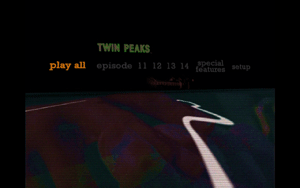
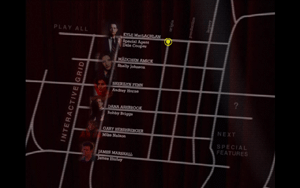
The sixth DVD also features interviews with twelve cast members covering three separate topics. Paramount has put these interviews together in an innovative fashion, creating an interactive grid that allows you to choose to listen to all the talks by a specific actor, hear them speak on one of the given topics ("Origin," "Production," or "Legacy"), or play everything straight through. The actors participating are Kyle MacLachlan, Mädchen Amick, Sherilyn Fenn, Dana Ashbrook, Garrison Hershberger (a.k.a. Mike Nelson, Bobby's jock cohort), James Marshall, David Duchovny, Kimmy Robertson, Don S. Davis (Major Briggs), Mary Jo Deschanel (Eileen Hayward), Lenny von Dohlen (the recluse Harold Smith), and Charlotte Stewart (Betty Briggs). It's kind of funny how many of them do David Lynch impressions. (39:00)
DVD 1 opens with a pre-menu where it looks like I should be able to select seeing previews or going straight to the main menu. None of the buttons on my remote worked to make either selection, however, and the more I actually fiddled with it, the pre-menu kept starting over and it took forever to actually get through it. Whereas the second time I put the DVD in, I just let it run, and it jumped to the main menu in about 30 seconds.
FINAL THOUGHTS:
Highly Recommended. What is it they say, that which burns brightest burns briefest? Twin Peaks - The Second Season was the final one for the series, and even within its twenty-two episodes, the show struggles to maintain its status as an avant-garde flashpoint in episodic television. Though it reaches its apex midway through when the mystery of Laura Palmer's murder is finally solved, the show creator's manage to find new ground to cover and keep the scripts lively with their send-ups of serialized storytelling. Though Twin Peaks rings out on a bum note, the rest of the chords are still worth the effort. These DVDs will once again capture your imagination just like the show did back in the early '90s.
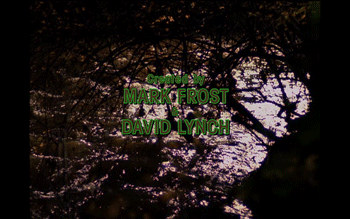
Jamie S. Rich is a novelist and comic book writer. He is best known for his collaborations with Joelle Jones, including the hardboiled crime comic book You Have Killed Me, the challenging romance 12 Reasons Why I Love Her, and the 2007 prose novel Have You Seen the Horizon Lately?, for which Jones did the cover. All three were published by Oni Press. His most recent projects include the futuristic romance A Boy and a Girl with Natalie Nourigat; Archer Coe and the Thousand Natural Shocks, a loopy crime tale drawn by Dan Christensen; and the horror miniseries Madame Frankenstein, a collaboration with Megan Levens. Follow Rich's blog at Confessions123.com.
|
| Popular Reviews |
| Sponsored Links |
|
|
| Sponsored Links |
|
|
| Release List | Reviews | Shop | Newsletter | Forum | DVD Giveaways | Blu-Ray | Advertise |
|
Copyright 2024 DVDTalk.com All Rights Reserved. Legal Info, Privacy Policy, Terms of Use,
Manage Preferences,
Your Privacy Choices | |||||||









